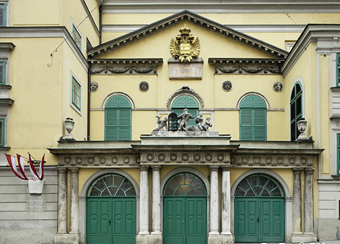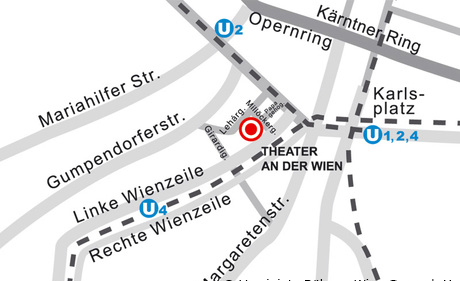Idomeneo
October 2024 | ||||||
|---|---|---|---|---|---|---|
Mo | Tu | We | Th | Fr | Sa | Su |
Dramma per musica in three acts
Libretto by Giambattista Varesco
For five years, Wolfgang Amadeus Mozart had not presented an opera on the stage. Then, in 1781, he finally received the long-awaited commission to write one. The drama he was being asked to set was a tragedy in the French style. Despite the difficulties posed by the task of turning it into a magnificent opera seria for the Munich carnival, the commission fired his imagination. Returning home to Crete from the Trojan War, King Idomeneo and his fleet of ships are caught in a raging storm. In a desperate attempt to be saved, he promises Neptune, god of the sea, to sacrifice the first person he meets on land, little knowing that this will be his own son. Mozart used this tale to write an anti-war opera in which he articulated his own “good news” for the first time: the triumph of humanism through the all-conquering power of love. With his music he not only transcended the rigid forms of the libretto he was forced to work with, but went even further: the work, like a kind of template, already contains all the stories, characters and emotions that were to give his later operas their everlasting popularity. Eighteen years after this masterpiece reopened the Theater an der Wien as Vienna’s third opera house in 2006, this new production, directed by the theatre’s artistic director, marks the return of the opera house to its newly refurbished home.
In Italian with German and English surtitles
Introduction to the work 30 minutes before curtain-up
Synopsis
Act 1
Island of Crete, shortly after the Trojan War. Ilia, daughter of the defeated Trojan King Priam, has been taken to Crete after the war. She loves Prince Idamante, son of the Cretan King Idomeneo, but hesitates to acknowledge her love. Idamante frees the Trojan prisoners in a gesture of good will. He tells Ilia, who is rejecting his love, that it is not his fault that their fathers were enemies. Trojans and Cretans together welcome the return of peace, but Electra, daughter of the Greek King Agamemnon, is jealous of Ilia and does not approve of Idamante's clemency toward the enemy prisoners. Arbace, the king's confidant, brings news that Idomeneo has been lost at sea while returning to Crete from Troy. Electra, fearing that Ilia, a Trojan, will soon become Queen of Crete, feels the furies of the underworld rise up in her heart (aria: "Tutte nel cor vi sento, furie del crudo averno" – "I feel you all in my heart, furies of the cruel underworld").
Idomeneo is saved by Neptune (god of the sea) and is washed up on a Cretan beach. There he recalls the vow he made to Neptune: to sacrifice, if he should arrive safely on land, the first living creature he should meet. Idamante approaches him, but because the two have not seen each other for a long time, recognition is difficult. When Idomeneo finally realizes the youth that he must sacrifice for the sake of his vow is his own child, he orders Idamante never to seek him out again. Grief-stricken by his father's rejection, Idamante runs off. Cretan troops disembarking from Idomeneo's ship are met by their wives, and all praise Neptune.
Act 2
At the king's palace, Idomeneo seeks counsel from Arbace, who says another victim could be sacrificed if Idamante were sent into exile. Idomeneo orders his son to escort Electra to her home, Argos. Idomeneo's kind words to Ilia move her to declare that since she has lost everything, he will be her father and Crete her country. As she leaves, Idomeneo realizes that sending Idamante into exile has cost Ilia her happiness as well as his own. Electra welcomes the idea of going to Argos with Idamante.
At the port of Sidon (a fictional city of Crete), Idomeneo bids his son farewell and urges him to learn the art of ruling while he is away. Before the ship can sail, however, a storm breaks out, and a sea serpent appears. Recognizing it as a messenger from Neptune, the king offers himself as atonement for having violated his vow to the god.
Act 3
In the royal garden, Ilia asks the breezes to carry her love to Idamante, who appears, explaining that he must go to fight the serpent. When he says he would rather die than suffer the torments of his rejected love, Ilia confesses her love. They are surprised by Electra and Idomeneo. When Idamante asks his father why he sends him away, Idomeneo can only reply that the youth must leave. Ilia asks for consolation from Electra, who is preoccupied with revenge. Arbace comes with news that the people, led by the High Priest of Neptune, are clamoring for Idomeneo. The High Priest tells the king of the destruction caused by Neptune's monster, urging Idomeneo to reveal the name of the person whose sacrifice is demanded by the god. When the king confesses that his own son is the victim, the populace is horrified.
Outside the temple, the king and High Priest join Neptune's priests in prayer that the god may be appeased. Arbace brings news that Idamante has killed the monster. As Idomeneo fears new reprisals from Neptune, Idamante enters in sacrificial robes, saying he understands his father's torment and is ready to die. After an agonizing farewell, Idomeneo is about to sacrifice his son when Ilia intervenes, offering her own life instead. The Voice of Neptune is heard. Idomeneo must yield the throne to Ilia and Idamante. Everyone is relieved except Electra, who longs for her own death. Idomeneo presents Idamante and his bride as the new rulers. The people call upon the god of love and marriage to bless the royal pair and bring peace.
Program and cast
Conductor: David Bates
Director: Stefan Herheim
Stage: Silke Bauer
Costume: Yashi
Light: Karl Wiedemann
Video: Roman Hagenbrock
Choreography: Beate Vollack
Dramaturgy: Christian Schröder
Idomeneo: Attilio Glaser
Idamante: Emily Sierra
Ilia: Jeanine De Bique
Elettra: Elena Tsallagova
Arbace / Gran Sacerdote: Ya-Chung Huang
La Voce: Levente Páll
Theater an der Wien
About the Theater an der Wien

The New Opera House is not just any theatre, but the one that Emanuel Schikaneder, the all-round genius, actor, impresario with a flair for organization but above all librettist of The Magic Flute, had built in 1801 in Vienna in keeping with the spirit of Mozart.
To coincide with the 250th anniversary of Mozart’s birth the Theater an der Wien presents itself as a new opera house from January 2006. As a “season” opera house with productions all the year round the Theater an der Wien carves a new and independent niche in the realm of high-quality culture in Vienna. For twelve months of the year, with one premiere every month, opera will be performed under the “stagione”, or season, system: that means the cast remains unchanged from the first performance to the last one, which guarantees that the very highest international standards are maintained.
The theatre’s modern, accessible approach to music theatre as demonstrated by the works performed, the overall artistic concept Bespielung and the artistes is further underlined by the building itself, its architecture and the vibrancy of its location. The surroundings and materials, the intimate atmosphere and perfect acoustics in the historical theatre prepare the senses to experience beauty. The Theater an der Wien deliberately enters into a symbiotic relationship with its lively surroundings on the Naschmarkt street market and the young cultural scene centred in the Schleifmühl quarter.
How to get there
With public transport:
 We can be reached by public transport:
We can be reached by public transport:
U1, U2 und U4 Station Karlsplatz, Exit Secession
Bus 59A Station Bärenmühldurchgang
Bus 57A Station Laimgrubengasse, pedestrians via Laimgrubengasse to Linke Wienzeile
KAMMEROPER:
Fleischmarkt 24, 1010 Wien
We can be reached by public transport:
U1, U4: Station Schwedenplatz
Tram Linie D (bei Ablenukung über Kai), 1, 2: Station Schwedenplatz
Bus 3A (on workdays)
Performances: Th 08 May 2025, 18:00
Performances: Mo 17 Mar 2025,
Performances: Su 22 Dec 2024,
Performances: Sa 09 Nov 2024,
Performances: Mo 09 Dec 2024,
Performances: Fr 13 Sep 2024,

 EN
EN DE
DE IT
IT FR
FR ES
ES RU
RU JP
JP RO
RO
 Seating plan
Seating plan 





